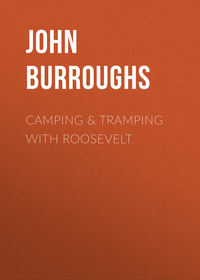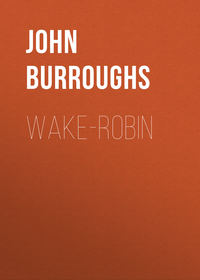 полная версия
полная версияWhitman: A Study
But let me give without further delay a fuller hint of the attitude these pages assume and hold towards the subject they discuss.
There are always, or nearly always, a few men born to each generation who embody the best thought and culture of that generation, and express it in approved literary forms. From Petrarch down to Lowell, the lives and works of these men fill the literary annals; they uphold the literary and scholarly traditions; they are the true men of letters; they are justly honored and beloved in their day and land. We in this country have recently, in the death of Dr. Holmes, mourned the loss of the last of the New England band of such men. We are all indebted to them for solace, and for moral and intellectual stimulus.
Then, much more rarely, there is born to a race or people men who are like an irruption of life from another world, who belong to another order, who bring other standards, and sow the seed of new and larger types; who are not the organs of the culture or modes of their time, and whom their times for the most part decry and disown, – the primal, original, elemental men. It is here, in my opinion, that we must place Whitman; not among the minstrels and edifiers of his age, but among its prophets and saviors. He is nearer the sources of things than the popular poets, – nearer the founders and discoverers, closer akin to the large, fervent, prophetic, patriarchal men who figure in the early heroic ages. His work ranks with the great primitive books. He is of the type of the skald, the bard, the seer, the prophet. The specialization and differentiation of our latter ages of science and culture is less marked in him than in other poets. Poetry, philosophy, religion, are all inseparably blended in his pages. He is in many ways a reversion to an earlier type. Dr. Brinton has remarked that his attitude toward the principle of sex and his use of sexual imagery in his poems, are the same as in the more primitive religions. Whitman was not a poet by elaboration, but by suggestion; not an artist by formal presentation, but by spirit and conception; not a philosopher by system and afterthought, but by vision and temper.
In his "Leaves," we again hear the note of destiny, – again see the universal laws and forces exemplified in the human personality, and turned upon life with love and triumph.
XIVThe world always has trouble with its primary men, or with the men who have any primary gifts, like Emerson, Wordsworth, Browning, Tolstoi, Ibsen. The idols of an age are nearly always secondary men: they break no new ground; they make no extraordinary demands; our tastes and wants are already adjusted to their type; we understand and approve of them at once. The primary men disturb us; they are a summons and a challenge; they break up the old order; they open up new territory which we are to subdue and occupy; the next age and the next make more of them. In my opinion, the next age and the next will make more of Whitman, and the next still more, because he is in the great world-current, in the line of the evolutionary movement of our time. Is it at all probable that Tennyson can ever be to any other age what he has been to this? Tennyson marks an expiring age, the sunset of the feudal world. He did not share the spirit to which the future belongs. There was not one drop of democratic blood in his veins. To him, the people were an hundred-headed beast.
XVIf my essay seems like one continual strain to attain the unattainable, to compass and define Whitman, who will not be compassed and defined, I can only say that I regret it, but could not well help it. Talking about Whitman, Symonds said, was like talking about the universe, and it is so. There is somewhat incommensurable in his works. One may not hope to speak the final word about him, to sum him up in a sentence. He is so palpable, so real, so near at hand, that the critic or expounder of him promises himself an easy victory; but before one can close with him he is gone. He is, after all, as subtle and baffling as air or light.
… "I will certainly elude you,Even while you should think you had unquestionably caught me, behold!Already you see I have escaped from you."It is probably this characteristic which makes Whitman an irrepressible figure in literature; he will not down for friend or foe. He escapes from all classification, and is larger than any definition of him that has yet been given. How many times has he been exploded by British and American critics; how many times has he been labeled and put upon the shelf, only to reappear again as vigorous and untranslatable as ever!
XVISo far as Whitman stands merely for the spirit of revolt, or of reaction against current modes in life and literature, I have little interest in him. As the "apostle of the rough, the uncouth," to use Mr. Howells's words, the world would long ago have tired of him. The irruption into letters of the wild and lawless, or of the strained and eccentric, can amuse and interest us only for a moment. It is because these are only momentary phases of him, as it were, and because underneath all he embraces the whole of life and ministers to it, that his fame and influence are still growing in the world. One hesitates even to call Whitman the poet of "democracy," or of "personality," or of "the modern," because such terms only half define him. He quickly escapes into that large and universal air which all great art breathes. We cannot sum him up in a phrase. He flows out on all sides, and his sympathies embrace all types and conditions of men. He is a great democrat, but, first and last and over all, he is a great man, a great nature, and deep world-currents course through him. He is distinctively an American poet, but his Americanism is only the door through which he enters upon the universal.
XVIICall his work poetry or prose, or what you will: that it is an inspired utterance of some sort, any competent person ought to be able to see. And what else do we finally demand of any work than that it be inspired? How all questions of form and art, and all other questions, sink into insignificance beside that! The exaltation of mind and spirit shown in the main body of Whitman's work, the genuine, prophetic fervor, the intensification and amplification of the simple ego, and the resultant raising of all human values, seem to me as plain as daylight.
Whitman is to be classed among the great names by the breadth and all-inclusiveness of his theme and by his irrepressible personality. I think it highly probable that future scholars and critics will find his work fully as significant and era-marking as that of any of the few supreme names of the past. It is the culmination of an age of individualism, and, as opposites meet, it is also the best lesson in nationalism and universal charity that this century has seen.
BIOGRAPHICAL AND PERSONAL
IWalt Whitman was born at West Hills, Long Island, May 30, 1819, and died at Camden, N. J., March 26, 1892. Though born in the country, most of his life was passed in cities; first in Brooklyn and New York, then in New Orleans, then in Washington, and lastly in Camden, where his body is buried. It was a poet's life from first to last, – free, unhampered, unworldly, unconventional, picturesque, simple, untouched by the craze of money-getting, unselfish, devoted to others, and was, on the whole, joyfully and contentedly lived. It was a pleased and interested saunter through the world, – no hurry, no fever, no strife; hence no bitterness, no depletion, no wasted energies. A farm boy, then a school-teacher, then a printer, editor, writer, traveler, mechanic, nurse in the army hospitals, and lastly government clerk; large and picturesque of figure, slow of movement; tolerant, passive, receptive, and democratic, – of the people; in all his tastes and attractions, always aiming to walk abreast with the great laws and forces, and to live thoroughly in the free, nonchalant spirit of his own day and land. His strain was mingled Dutch and English, with a decided Quaker tinge, which came from his mother's side, and which had a marked influence upon his work.
The spirit that led him to devote his time and substance to the sick and wounded soldiers during the war may be seen in that earlier incident in his life when he drove a Broadway stage all one winter, that a disabled driver might lie by without starving his family. It is from this episode that the tradition of his having been a New York stage-driver comes. He seems always to have had a special liking for this class of workmen. One of the house surgeons of the old New York Hospital relates that in the latter part of the fifties Whitman was a frequent visitor to that institution, looking after and ministering to disabled stage-drivers. "These drivers," says the doctor, "like those of the omnibuses in London, were a set of men by themselves. A good deal of strength, intelligence, and skillful management of horses was required of a Broadway stage-driver. He seems to have been decidedly a higher order of man than the driver of the present horse-cars. He usually had his primary education in the country, and graduated as a thorough expert in managing a very difficult machine, in an exceptionally busy thoroughfare.
"It was this kind of a man that so attracted Walt Whitman that he was constantly to be seen perched on the box alongside one of them going up and down Broadway. I often watched the poet and driver, as probably did many another New Yorker in those days.
"I do not wonder as much now as I did in 1860 that a man like Walt Whitman became interested in these drivers. He was not interested in the news of every-day life – the murders and accidents and political convulsions – but he was interested in strong types of human character. We young men had not had experience enough to understand this kind of a man. It seems to me now that we looked at Whitman simply as a kind of crank, if the word had then been invented. His talk to us was chiefly of books, and the men who wrote them: especially of poetry, and what he considered poetry. He never said much of the class whom he visited in our wards, after he had satisfied himself of the nature of the injury and of the prospect of recovery.
"Whitman appeared to be about forty years of age at that time. He was always dressed in a blue flannel coat and vest, with gray and baggy trousers. He wore a woolen shirt, with a Byronic collar, low in the neck, without a cravat, as I remember, and a large felt hat. His hair was iron gray, and he had a full beard and mustache of the same color. His face and neck were bronzed by exposure to the sun and air. He was large, and gave the impression of being a vigorous man. He was scrupulously careful of his simple attire, and his hands were soft and hairy."
During the early inception of "Leaves of Grass" he was a carpenter in Brooklyn, building and selling small frame-houses to working people. He frequently knocked off work to write his poems. In his life Whitman was never one of the restless, striving sort. In this respect he was not typical of his countrymen. All his urgency and strenuousness he reserved for his book. He seems always to have been a sort of visitor in life, noting, observing, absorbing, keeping aloof from all ties that would hold him, and making the most of the hour and the place in which he happened to be. He was in no sense a typical literary man. During his life in New York and Brooklyn, we see him moving entirely outside the fashionable circles, the learned circles, the literary circles, the money-getting circles. He belongs to no set or club. He is seen more with the laboring classes, – drivers, boatmen, mechanics, printers, – and I suspect may often be found with publicans and sinners. He is fond of the ferries and of the omnibuses. He is a frequenter of the theatre and of the Italian opera. Alboni makes a deep and lasting impression upon him. It is probably to her that he writes these lines: —
"Here take this gift,I was reserving it for some hero, speaker, general,One who should serve the good old cause, the great idea, the progress and freedom of the race,Some brave confronter of despots, some daring rebel;But I see that what I was reserving belongs to you just as much as to any."Elsewhere he refers to Alboni by name and speaks of her as
"The lustrous orb, Venus contralto, the blooming mother,Sister of loftiest gods."Some of his poems were written at the opera. The great singers evidently gave him clews and suggestions that were applicable to his own art.
His study was out of doors. He wrote on the street, on the ferry, at the seaside, in the fields, at the opera, – always from living impulses arising at the moment, and always with his eye upon the fact. He says he has read his "Leaves" to himself in the open air, and tried them by the realities of life and nature about him. Were they as real and alive as they? – this was the only question with him.
At home in his father's family in Brooklyn we see him gentle, patient, conciliatory, much looked up to by all. Neighbors seek his advice. He is cool, deliberate, impartial. A marked trait is his indifference to money matters; his people are often troubled because he lets opportunities to make money pass by. When his "Leaves" appear, his family are puzzled, do not know what to make of it. His mother thinks that, if "Hiawatha" is poetry, may be Walt's book is, too. He never counsels with any one, and is utterly indifferent as to what people may say or think. He is not a stirring and punctual man, is always a little late; not an early riser, not prompt at dinner; always has ample time, and will not be hurried; the business gods do not receive his homage. He is gray at thirty, and is said to have had a look of age in youth, as he had a look of youth in age. He has few books, cares little for sport, never uses a gun; has no bad habits; has no entanglements with women, and apparently never contemplates marriage. It is said that during his earliest years of manhood he kept quite aloof from the "girls."
At the age of nineteen he edited "The Long Islander," published at Huntington. A recent visitor to these early haunts of Whitman gathered some reminiscences of him at this date: —
"Amid the deep revery of nature, on that mild October afternoon, we returned to the village of Huntington, there to meet the few, the very few, survivors who recall Walt's first appearance in the literary world as the editor of 'The Long Islander,' nigh sixty years ago (1838). Two of these forefathers of the hamlet clearly remembered his powerful personality, brimful of life, reveling in strength, careless of time and the world, of money and of toil; a lover of books and of jokes; delighting to gather round him the youth of the village in his printing-room of evenings, and tell them stories and read them poetry, his own and others'. That of his own he called his 'Yawps,' a word which he afterwards made famous. Both remembered him as a delightful companion, generous to a fault, glorying in youth, negligent of his affairs, issuing 'The Long Islander' at random intervals, – once a week, once in two weeks, once in three, – until its financial backers lost faith and hope and turned him out, and with him the whole office corps; for Walt himself was editor, publisher, compositor, pressman, and printer's devil, all in one."
IIFew men were so deeply impressed by our Civil War as was Whitman. It aroused all his patriotism, all his sympathies, and, as a poet, tested his power to deal with great contemporary events and scenes. He was first drawn to the seat of war on behalf of his brother, Lieutenant-Colonel George W. Whitman, 51st New York Volunteers, who was wounded by the fragment of a shell at Fredericksburg. This was in the fall of 1862. This brought him in contact with the sick and wounded soldiers, and henceforth, as long as the war lasts and longer, he devoted his time and substance to ministering to them. The first two or three years of his life in Washington he supported himself by correspondence with Northern newspapers, mainly with the "New York Times." These letters, as well as the weekly letters to his mother during the same period, form an intensely pathetic and interesting record.
They contain such revelations of himself, and such pictures of the scenes he moved among, that I shall here quote freely from them. The following extract is from a letter written from Fredericksburg the third or fourth day after the battle of December, 1862: —
"Spent a good part of the day in a large brick mansion on the banks of the Rappahannock, immediately opposite Fredericksburg. It is used as a hospital since the battle, and seems to have received only the worst cases. Out of doors, at the foot of a tree, within ten yards of the front of the house, I notice a heap of amputated feet, legs, arms, hands, etc., about a load for a one-horse cart. Several dead bodies lie near, each covered with its brown woolen blanket. In the door-yard, toward the river, are fresh graves, mostly of officers, their names on pieces of barrel-staves, or broken board, stuck in the dirt. (Most of these bodies were subsequently taken up and transported North to their friends.)
"The house is quite crowded, everything impromptu, no system, all bad enough, but I have no doubt the best that can be done; all the wounds pretty bad, some frightful, the men in their old clothes, unclean and bloody. Some of the wounded are rebel officers, prisoners. One, a Mississippian, – a captain, – hit badly in leg, I talked with some time; he asked me for papers, which I gave him. (I saw him three months afterward in Washington, with leg amputated, doing well.)
"I went through the rooms, down stairs and up. Some of the men were dying. I had nothing to give at that visit, but wrote a few letters to folks home, mothers, etc. Also talked to three or four who seemed most susceptible to it, and needing it."
"December 22 to 31. – Am among the regimental, brigade, and division hospitals somewhat. Few at home realize that these are merely tents, and sometimes very poor ones, the wounded lying on the ground, lucky if their blanket is spread on a layer of pine or hemlock twigs, or some leaves. No cots; seldom even a mattress on the ground. It is pretty cold. I go around from one case to another. I do not see that I can do any good, but I cannot leave them. Once in a while some youngster holds on to me convulsively, and I do what I can for him; at any rate, stop with him and sit near him for hours, if he wishes it.
"Besides the hospitals, I also go occasionally on long tours through the camps, talking with the men, etc.; sometimes at night among the groups around the fires, in their shebang enclosures of bushes. I soon get acquainted anywhere in camp, with officers or men, and am always well used. Sometimes I go down on picket with the regiments I know best."
After continuing in front through the winter, he returns to Washington, where the wounded and sick have mainly been concentrated. The Capital city, truly, is now one huge hospital; and there Whitman establishes himself, and thenceforward, for several years, has but one daily and nightly avocation.
He alludes to writing letters by the bedside, and says: —
"I do a good deal of this, of course, writing all kinds, including love-letters. Many sick and wounded soldiers have not written home to parents, brothers, sisters, and even wives, for one reason or another, for a long, long time. Some are poor writers, some cannot get paper and envelopes; many have an aversion to writing, because they dread to worry the folks at home, – the facts about them are so sad to tell. I always encourage the men to write, and promptly write for them."
A glimpse of the scenes after Chancellorsville: —
"As I write this, in May, 1863, the wounded have begun to arrive from Hooker's command from bloody Chancellorsville. I was down among the first arrivals. The men in charge of them told me the bad cases were yet to come. If that is so, I pity them, for these are bad enough. You ought to see the scene of the wounded arriving at the landing here foot of Sixth Street at night. Two boat-loads came about half past seven last night. A little after eight, it rained a long and violent shower. The poor, pale, helpless soldiers had been debarked, and lay around on the wharf and neighborhood anywhere. The rain was, probably, grateful to them; at any rate they were exposed to it.
"The few torches light up the spectacle. All around on the wharf, on the ground, out on side places, etc., the men are lying on blankets and old quilts, with the bloody rags bound round heads, arms, legs, etc. The attendants are few, and at night few outsiders also, – only a few hard-worked transportation men and drivers. (The wounded are getting to be common, and people grow callous.) The men, whatever their condition, lie there, and patiently wait till their turn comes to be taken up. Near by the ambulances are now arriving in clusters, and one after another is called to back up and take its load. Extreme cases are sent off on stretchers. The men generally make little or no ado, whatever their sufferings, – a few groans that cannot be repressed, and occasionally a scream of pain, as they lift a man into the ambulance.
"To-day, as I write, hundreds more are expected, and to-morrow and the next day more, and so on for many days.
"The soldiers are nearly all young men, and far more American than is generally supposed, – I should say nine tenths are native-born. Among the arrivals from Chancellorsville I find a large proportion of Ohio, Indiana, and Illinois men. As usual, there are all sorts of wounds. Some of the men are fearfully burnt from the explosion of artillery caissons. One ward has a long row of officers, some with ugly hurts. Yesterday was, perhaps, worse than usual. Amputations are going on, – the attendants are dressing wounds. As you pass by, you must be on your guard where you look. I saw, the other day, a gentleman – a visitor, apparently, from curiosity – in one of the wards stop and turn a moment to look at an awful wound they were probing, etc. He turned pale, and in a moment more he had fainted away and fallen on the floor."
An episode, – the death of a New York soldier: —
"This afternoon, July 22, 1863, I spent a long time with a young man I have been with a good deal from time to time, named Oscar F. Wilber, company G, 154th New York, low with chronic diarrhœa, and a bad wound also. He asked me to read him a chapter in the New Testament. I complied, and asked him what I should read. He said: 'Make your own choice.' I opened at the close of one of the first books of the Evangelists, and read the chapters describing the latter hours of Christ and the scenes at the crucifixion. The poor, wasted young man asked me to read the following chapter also, how Christ rose again. I read very slowly, as Oscar was feeble. It pleased him very much, yet the tears were in his eyes. He asked me if I enjoyed religion. I said: 'Perhaps not, my dear, in the way you mean, and yet, maybe, it is the same thing.' He said: 'It is my chief reliance.' He talked of death, and said he did not fear it. I said: 'Why, Oscar, don't you think you will get well?' He said: 'I may, but it is not probable.' He spoke calmly of his condition. The wound was very bad; it discharged much. Then the diarrhœa had prostrated him, and I felt that he was even then the same as dying. He behaved very manly and affectionate. The kiss I gave him as I was about leaving he returned fourfold. He gave me his mother's address, Mrs. Sally D. Wilber, Alleghany post-office, Cattaraugus County, New York. I had several such interviews with him. He died a few days after the one just described."
And here, also, a characteristic scene in another of those long barracks: —
"It is Sunday afternoon (middle of summer, 1864), hot and oppressive, and very silent through the ward. I am taking care of a critical case, now lying in a half lethargy. Near where I sit is a suffering rebel, from the 8th Louisiana; his name is Irving. He has been here a long time, badly wounded, and has lately had his leg amputated. It is not doing very well. Right opposite me is a sick soldier boy, laid down with his clothes on, sleeping, looking much wasted, his pallid face on his arm. I see by the yellow trimming on his jacket that he is a cavalry boy. He looks so handsome as he sleeps, one must needs go nearer to him. I step softly over to him, and find by his card that he is named William Cone, of the 1st Maine Cavalry, and his folks live in Skowhegan."
In a letter to his mother in 1863 he says, in reference to his hospital services: "I have got in the way, after going lightly, as it were, all through the wards of a hospital, and trying to give a word of cheer, if nothing else, to every one, then confining my special attention to the few where the investment seems to tell best, and who want it most… Mother, I have real pride in telling you that I have the consciousness of saving quite a number of lives by keeping the men from giving up, and being a good deal with them. The men say it is so, and the doctors say it is so; and I will candidly confess I can see it is true, though I say it myself. I know you will like to hear it, mother, so I tell you."









